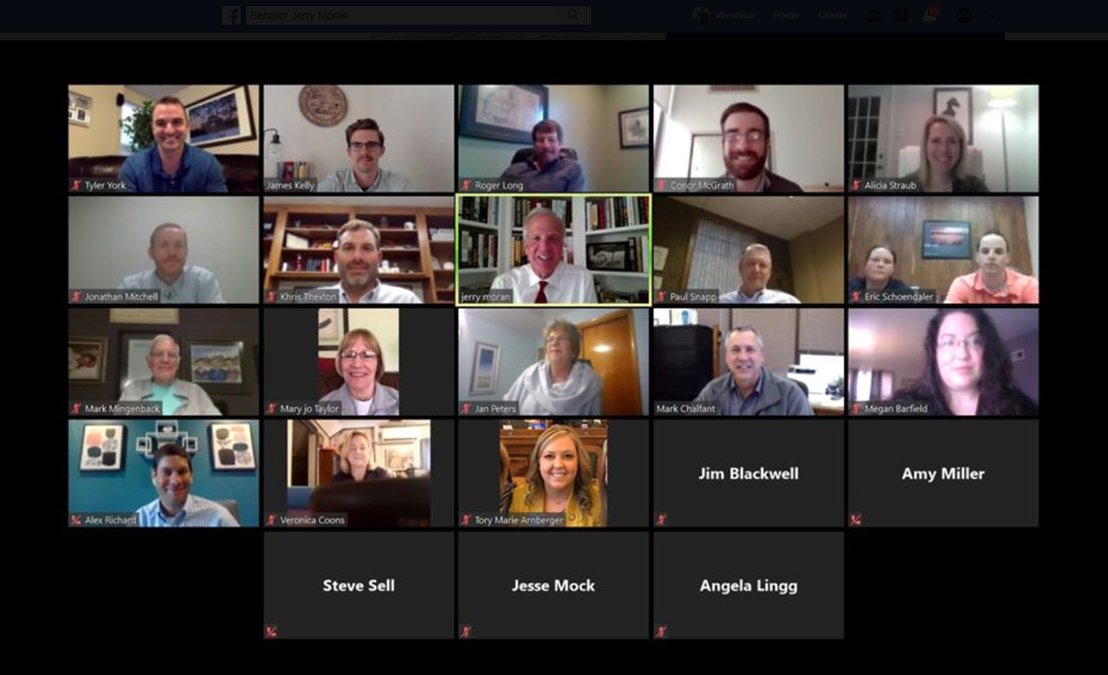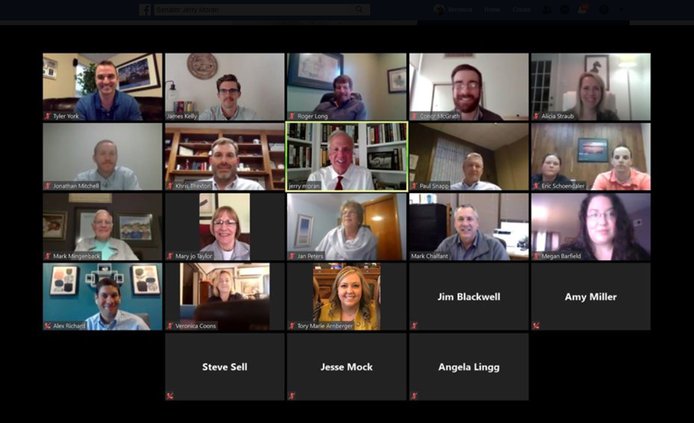Wednesday afternoon, U.S. Senator Jerry Moran hosted a video conference call with state, county and business leaders from across Barton County. County and City administrators from Great Bend and Hoisington, several bankers, business owners, representatives from Great Bend and Hoisington hospitals, non-profits, Chambers of Commerce, the Barton County Health Department and Emergency Management were on the call, and provided feedback on how they’ve been coping with the measures taken over the past two months to mitigate the spread of COVID-19.
Moran started out the call informing the group of his concern that continued government spending including expanded unemployment and relief to small businesses will lead to a dire financial situation for the country in the future.
“I am worrying that the next crisis in our country will be generated by deficit spending, and a terrible,terrible increase in the size and scope of government,” he said. He expressed hope that efforts by our health departments so far will mean peoples health will be stabilizing and reaching a plateau this summer, and the current crisis will move behind us.”I think the solution to our economy can’t be too much more in regard to more taxpayer spending, more deficit borrowing, but getting the economy back in which people are actually working and paying taxes.”
He also shared his frustration and concern that Kansas is currently at the bottom of the federal government’s list of priority states for receiving testing kits for the disease, and assured those on the call that he is working hard to get more tests here.
“If we could get testing widely spread across the country, people would know what it is that they face, whether they’re a carrier, whether they’re immune, and how comfortable they are in returning,” he said. Opening for business won’t ensure people will go back to work or be willing to engage in business. “I would suggest that if we can all be tested, so we know where we are...it would get us back to a point in which we are closer to where we want to be. The economy is the only thing that can pay for the bills.”
He invited questions and comments, and bankers expressed their agreement with his assessment of the future financial outlook of the nation if the economy isn’t reactivated soon.
“My primary concern is just what we’re doing to the economy,” said Paul Snapp, CEO First Kansas Bank. “Whether it’s agriculture or oil, or the sheer vastness of the US economy, it’s not a light switch. We can’t turn it on and off. I hope to goodness we haven’t created the Great Depression.”
He did note the PPP program worked remarkably well, and it would do a lot of good in Barton County. But, he said, the fixed costs of running a business go far beyond payroll, and that many businesses did not have enough of a cushion to survive.
Moran concurred. The outlook for both the agricultural and oil sectors of the economy are of particular concern with commodity prices dropping. Farmers and the gas industry can ask for assistance from taxpayers, he said, but the only real answer is getting the economy churning, and people buying things as quickly as possible.
Karen Winkelman, Barton County Health Department director, commented on community testing. Last week, during a daily update with the KDHE, discussion about community testing prompted her to move forward with preparing her department to be ready to start doing that. Earlier Wednesday, she met with Barton County Administrator Phil Hathcock and confirmed they have all the logistics in place to start as early as Monday or Tuesday if that were an option. She was told by KDHE that the next step is balancing which parts of the state are the most lacking in testing with the amount of supplies they currently have or expect to get later.
“They said they would keep me posted, but Barton County has extended that offer to provide community testing here,” she said. She said the county has some supplies in hand, just not enough to really do a big push.
As of last week, Moran said, the state intended to increase the amount of testing being done at Dodge City, Liberal and Garden City, but also mentioned Thomas and Cloud Counties. He’s looking into the criteria being used to determine what counties get more intensive community testing.
“We have nine confirmed cases, but we know there’s more out there,” Winkelman said. “So we would be willing to be one of those counties.”
Mark Chalfant, president of Fuller Industries, was a bright spot in the conversation. The company has recently upped production of hand sanitizer to 10,000 gallons per day which it is supplying to institutions around the country. They are also ramping up to produce another 25,000 gallons a day, but the supply chain has been their biggest enemy in getting to that point. Finding containers, and sourcing ethanol were two hurdles he mentioned. The company was able to source the ethanol, but is gearing up to produce some of its own containers now, becoming more vertically integrated.
“I think this is a great opportunity to reevaluate our reshoring strategy as a nation,” Chalfant said. Manufacturing has a very high multiplier effect, he added, and could create more jobs and might help to stimulate the economy.”





